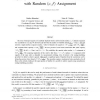Free Online Productivity Tools
i2Speak
i2Symbol
i2OCR
iTex2Img
iWeb2Print
iWeb2Shot
i2Type
iPdf2Split
iPdf2Merge
i2Bopomofo
i2Arabic
i2Style
i2Image
i2PDF
iLatex2Rtf
Sci2ools
MOBIHOC
2007
ACM
2007
ACM
Capacity of multi-channel wireless networks with random (c, f) assignment
The issue of transport capacity of a randomly deployed wireless network under random (c, f ) channel assignment was considered by us in [1]. We showed in [1] that when the number of available channels is c = O(logn), and each node has a single interface assigned a random f subset of channels, the capacity is (W f cnlogn ) and O(W prnd nlogn ), and conjectured that capacity is (W prnd nlogn ). We now present a lower bound construction that yields capacity (W prnd nlogn ) for all c = O(logn) and 2 f c. This establishes the capacity under random (c, f ) assignment as (W prnd nlogn ). The surprising implication of this result is that when f = ( c), random (c, f ) assignment yields capacity of the same order as attainable via unconstrained switching. Also of interest is the routing/scheduling procedure we utilize to achieve capacity, which marks a significant point of departure from the construction used to obtain the previous lower bound of (W f cnlogn ). This procedure requires synchr...
| Added | 24 Dec 2009 |
| Updated | 24 Dec 2009 |
| Type | Conference |
| Year | 2007 |
| Where | MOBIHOC |
| Authors | Vartika Bhandari, Nitin H. Vaidya |
Comments (0)

